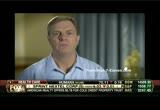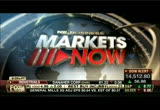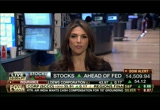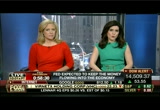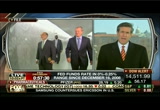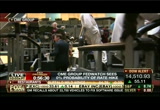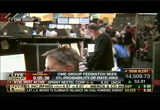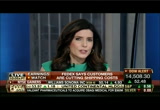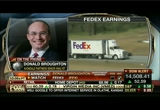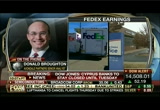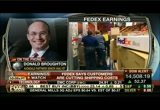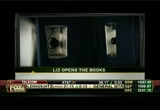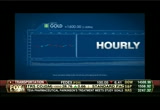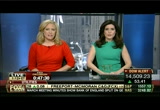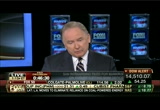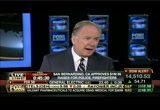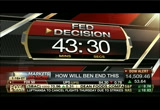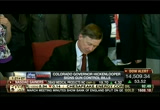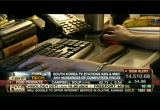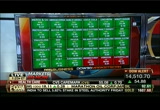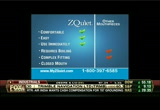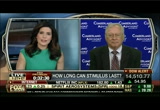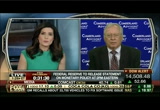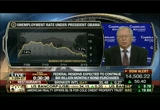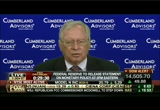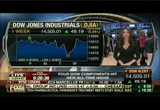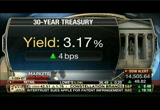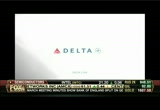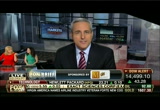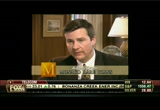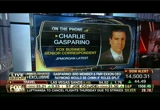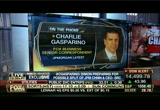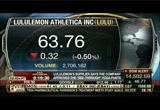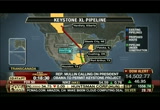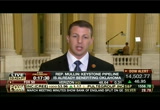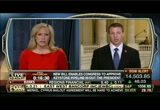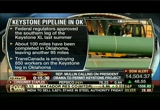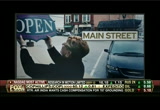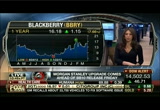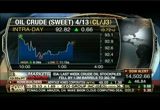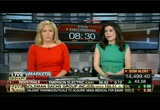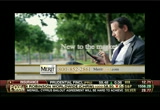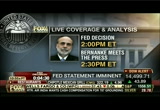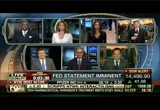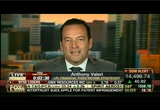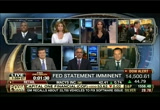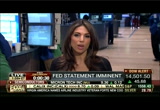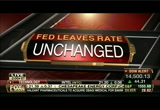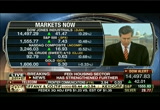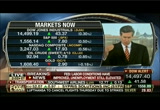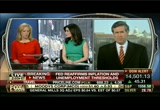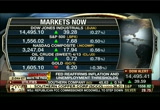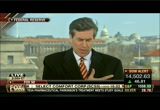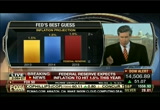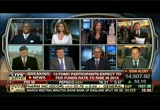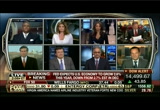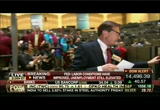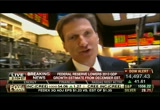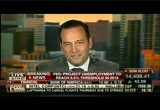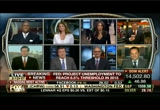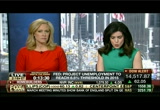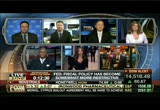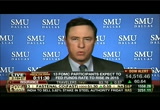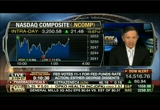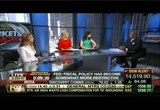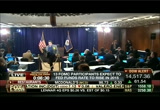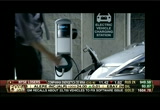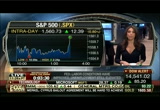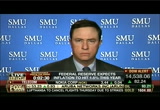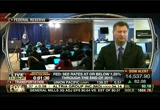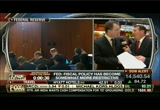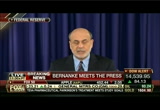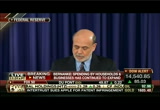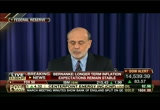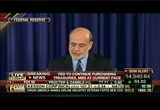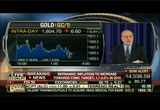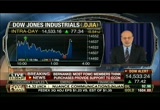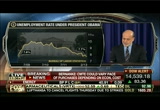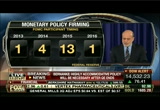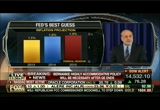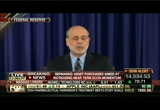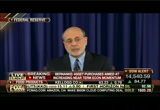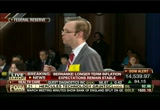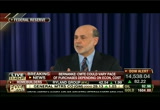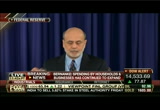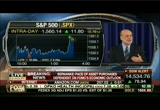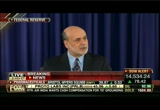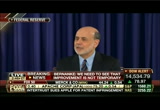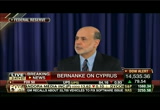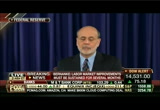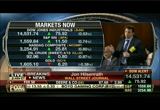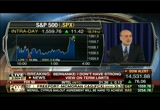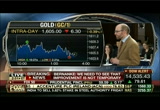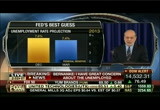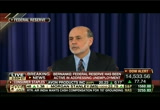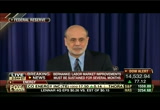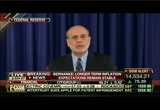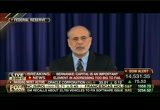tv Markets Now FOX Business March 20, 2013 1:00pm-3:00pm EDT
1:02 pm
how long can they continue to put money into the economy? they let us know the exit plan for all of this. melissa: taxpayer outrage, bankrupt city in california paying out a million dollars in pay raises. they are bankrupt. lori: and paying races? crazy town. fedex says more customers are taking a less expensive option and it is hitting the bottom line. melissa: the cyber threat hit by online hackers putting financial firms here on high alert. but first, time for stocks now. nicole petallides is standing by. stocks posted solid gains ahead of the fed decision. nicole: that is right. everybody focused on the fed about an hour away from now. very accommodated if fed, and we're watching a market hitting
1:03 pm
new all-time highs in the dow jones industrial. of almost 56 points at the moment showing you some names that hit some highs today including nativ united technolo. hitting the highest levels we've ever seen for those names and we cannot leave out verizon. the highest levels we'v we haven in over 11 years. so while the shareholders have been enjoying great dividends, they can now also note multi-year highs as well. as we talked about the rally we are seeing, going from sector to sector. a lot of of pharaohs, back to you. lori: the question is how long the fed chairman can keep it up. peter barnes will have the announcement in d.c., joining us first with a preview.
1:04 pm
peter: that is right, the fed chairman and the members expected to keep the metal to po the metal. keeping interest rates right now the fed is buying 8 85 win dolls worth of bonds each month to help keep interest rates low and pushing even lower each month in mortgage-backed securities. as you may recall in the january minutes, the members decided they would do a serious deep review of how the program is working. how they are helping or not, and what type of risks the program could present to the economy as they eventually decide to wind down. other concerns, some improvement in economic numbers for the retail sales and housing and job
1:05 pm
creation, but the headwind with tax increases january 1, the sequester spending cuts kicking in and now all these issues coming out of europe, all things we expect the chairman ben bernanke to talk about in the press conference in 90 minutes from now. lori: peter, thank you. melissa: just under an hour until the fed decision, what our futures traders betting on? jeff flock with that, what are they betting on? jeff: the difference in the trading options, contrast that and all the people you see, walk up here with me if you would, this is the fed funds futures pit, u.s. interest rates, do you see the tumbleweeds blowing
1:06 pm
through the picks? take a look at what the bets are. the fed watches something the cme keeps out. the fed percentage possibilities of a fed rate hike. march 2014 meeting a year away, and 8% chance. in october 201432% chance. you have to go to the june meeting of 2015 before you get more than a 50% chance of a rate hike. what are the possibilities it will be a half a point where three quarters of a point or a point. we can break that down for you up there now. there wasn't a lot of trading, but going forward, the trading has increased, the volumes have increased, a possibility that perhaps the economy recovers and the fed someday does something positive and hikes rates, but right now you see what you see.
1:07 pm
lori: if you buy the fed fund future targets, that is when we will see the unemployment targets 6.5%, at least that is what the fed has been telling us. jeff flock, many thanks. let's talk earnings, a bellwether for the economy, talking about fedex saying customers are getting cheap and it is costing them missing earnings expectations by a whopping $0.16 per share. down 5% on the news now down 6% or $6.43, but the worst decline in 18 months for this stock. senior analyst joining us to tell us what it all means for fedex restructuring efforts. so what went wrong in the quarter for fedex? >> the most profitable thing they do is fly across the
1:08 pm
atlantic, and what we saw was dramatic decline not only in demand, but a decline in yields, what they're able to charge for the boxes, so we so yield dropped by 3.4% and with the most profitable thing to do is declining, it is hard to post year-over-year increases in profit. lori: what is the message there? >> the world economy is maybe not growing as fast as many would want us to believe. on the flip side of it is we saw 10% growth in th ground, conting to do very well, those segments are respectable of what is happening with e-commerce here and the local economy. the u.s. economy looks like it is although slow growth, no growth, due to better than the world economy. lori: dimensioned ground over air is a choice.
1:09 pm
the surge in online shopping and so many of these retailers offering free shipping, would you think that would help to offset the disappointing earnings report for this quarter? >> absolutely. that is one of the things that disappointed us. it is a cooperation with the post office, we knew the ground business was doing very well, the parcels of the business, but would be expected to do better was the domestic express business because we saw in the end of february and december was interesting because christmas came on a tuesday and so on friday before christmas the 21st we saw a number of high-end retailers, saks fifth avenue, you name it, all offering free shipping, express shipping if you clicked before noon on friday. the good news is that led to a surge in business turn a
1:10 pm
negative business on volume last quarter into a positive this quarter. but the yield should have been better. lori: i want to get your take on the cost-cutting fedex is doing with these management buyout. 10% have accepted the buyout. are you satisfied with how they are restructuring? >> i am. our booklet has been this. it is a three-year plan, over that three years they will definitely change the complexion of the business, the profitability of the business, but that it is neither going to be a smooth transition for an immediate transition and that is what happens when you make fundamental changes the way companies do business. lori: thank you very much. fedex today around $100.
1:11 pm
melissa: we're counting down to today's fed announcement at 2:00 p.m. eastern, the fed keeping the money flowing. how the fed chairman stands to get out of all of this. lori: the cyber threat and some south korean banks financial firms here on high alert. melissa: congress may be ready to agree on one thing. how lawmakers are ready to push ahead with the keystone pipeline. are they doing it without the president? first, take a look at metals heading out to break. trading lower on gold and silver, but copper is up 1.3%. we will be right back. friday night, buddy.
1:12 pm
1:14 pm
1:15 pm
tom sullivan is here with this unbelievable story. >> it rubs everybody wrong. the bankruptcy they filed back in august, it has been that long already, and they are still waiting for all the bankruptcy judges typically come in and take over because of the fact san bernardino like a lot of cities in california is a charter city and the charter says our public safety, police and fire will be the average of the 10 cities that remark down here we agree to, so the average pay for police and fire in all of these other cities is what the police and fire in san bernardino had to be paid by charter. i am waiting for the bankruptcy judge to come in and tear up the charter. melissa: what is taking so long? >> government and the pension plan. they have been given a chance to
1:16 pm
go in and see if they can find money in san bernardino that san bernardino can find in their own books because they're in a big fight. san bernardino says we owe $143 billion, $143 million in pension, helpers says you owe $250 million. so they don't even agree on how much everybody is owed. lori: how much of the wage increases and even if the city isn't bankrupt, still has to put a tremendous burden because so many cities are in distress. melissa: is very common in california. it is about, the total budget for san bernardino is $250 million per year. police 64 million, the firefighters 30 some million, just shy of 100 million so it is pretty close to half of the whole entire city budget is police and fire. they get automatic pay raises based on the charter. the city council has had a vote to tear up the charter and they
1:17 pm
won't do it because the members supported by the unions vote lets keep the charter, they will have to wait for the bank of the judge t make a decision on this and really deal with the bankrupt city. lori: this is ridiculous beyond words. melissa: it is part of the law. it is a contract on a bankruptcy judge can change. melissa: thank you for breaking it down for us. lori: nicole, you're watching the energy sector. nicole: i am, indeed. certainly jumping on an oil discovery so let's break it down a little bit. let's first focus on petroleum hating a new high of 3.5% right now, looking like an all-time high, but there could have been a pop somewhere. looks like it could have been an all-time high. the company is jumping on the
1:18 pm
news there was a discovery made in the gulf of mexico, one of the largest in the gulf, and it encountered more than 1000 feet of oil containing rocks, this is a big deal, and there are other partners in this well. a 30% stake in the well, conoco phillips. marathon oil has a 10% stake. all of these names are up year-to-date and are all winners today. back to you. lori: thanks. melissa: the cyber threat putting down banks in south korea. lori: at closer to today's decision from the federal reserve, a fed watcher wants to know if ben bernanke's plan is to get out of all of the stimulus. let's check the dollar ahead of the fed, see how it is faring today. approaching yet another record,
1:20 pm
governor of getting it done. you know how to dance... with a deadline. and you...rent from national. because only national lets you choose any car in the aisle... and go. you can even take a full-size or above, and still pay the mid-size price. this is awesome. [ male announcer ] yes, it is, business pro. yes, it is. go national. go like a pro.
1:23 pm
says the u.s. will stand by israel as his strongest ally and greatest friend. the president meeting with israeli leaders on this first trip to israel since taking office. other stuff scheduled during the trip including jordan. 58-year-old was murdered last night when he answered the front door of his home near colorado springs. he has led the states prison system for two years. colorado governor has signed a package of gun-control bills requiring background checks and banning the sale of magazines with more than 15 rounds. colorado is the state where the next 99 columbine high school massacre and last year's aurora, colorado, movie theater massacre occurred. back to melissa and lori. melissa: thank you so much. corporate it departments have
1:24 pm
new cause for concern after several south korean banks and tv broadcasters fell victim to cyber attacks earlier this morning. our own shibani joshi has details and who may be responsible. melissa: a pretty scary story because it is yet another example of a major cyber attack another report of it. not on our own shores, but it shows how dangerous and paralyzing the web attacks can be on an economy and on an entire nation. south korean police officials say several banks and three of the nation's top three broadcasters were hit by major cyber attack that paralyze computer networks, cost atms malfunction and cause tv screens to go blank. fingers being pointed at north korea, believed to be behind similar attacks against south korea in 2009 and 2011. home too many companies we do business with in the united states including samsung, lg and hyundai.
1:25 pm
it provides another very clear example of just how costly cyber crimes are. in fact south korean index fell 1% today and business halted in many parts of that nation. yet another red flag for us to pay attention to write here. melissa: thank you so much. lori: as we count down to today's fed decision coming at you, one former fed economist says he wants to know how ben bernanke plans to stop pumping money into the economy and what the ramifications will be if he does. melissa: and we may have a deal on capitol hill for the keystone pipeline. lawmakers may be ready to move ahead without the president. and we cross over all-time intraday high for the dow today. look at which stocks are benefiting from the move. flying higher. we will be right back.
1:29 pm
lori: the federal reserve announcement at the top of the hour, 2:00 p.m. eastern. while my next guest is in expecting policy change, he says we may get some new insight into how long fed chief ben bernanke can keep pumping money into the economy. the chief monetary economist, formally from the u.s. federal reserve. thank you for joining us, sir. >> my pleasure. lori: expecting any surprises from bernanke and company this afternoon? >> not in terms of policy and don't expect any change in rules, they will keep interest rates low, at the present levels i think for some period of time
1:30 pm
yet. maybe even more likely by the events in europe and cyprus. where i would be interested in is what, if anything, in terms of changes will be made in the exit strategy. they didn't visit that issue last time not until june of 2011 and since then i haven't devised a strategy but giving some hints through speeches and everything they may not engage in asset sales, and that would be a big deal. lori: we have had an improvement in job creation, improvement in retail sales and headwind as peter barnes put it especially with the cyprus. how do you think it will all net out? will it give us more insight into how he plans to initiate the exit strategy and what he thinks the market reaction will be to that? >> i think that is a logical question for the people at the
1:31 pm
press conference to pursue with since he mentioned in his testimony before congress that was something they were going to be looking at, citing tha settil be one of those questions even if he doesn't raise it, the press corps will raise it with him. i am confident they have been looking at this issue. lori: airport in june, 2015, when the market players do you expect them to raise rates. what do you think, do you agree with that? 6.5% at that time? the fed's target? >> it will really depend on what the job growth is and if you have about 210,000 jobs per month, that is from now until that time looking at the best possible case would be sometime in early 2014, but i don't think that is very likely, and i think 2015 is probably right now our best guess on everybody's part
1:32 pm
especially the markets. lori: what are your thoughts on the monetary policy up until now? >> it has been desperate, aggressive, has not been afraid to pursue the alternatives. my real worry is what the exit strategy is going to be and what the consequences in all this expansion particularly blowing up the fed don't shoot will be and how they will get out of bed. lori: what do you think the message of the rates being up ahead of the announcement is? >> part of that is due to the uncertainty of what is happening in europe and a lot of other things. causing longer-term rates to move day today, but i don't think it is related to the ester interest rate decisions. lori: many thanks. please be sure to keep it here
1:33 pm
on fox business for four coverage of the fed's decision and fed chairman ben bernanke's news conference at 2:00 p.m. eastern and we will be right here to guide you along. melissa: time for stocks as we do every 15 minutes, nicole petallides standing by. we're just about a half an hour from that decision. nicole: a half an hour away from hearing what they are thinking pertaining to our economy. we are certainly seeing a great day on wall street, you're happy to have seen we hit an all-time intraday high today that the market are seeing broad-based gains whether it is financials or retailers, many of them are hitting highs. multi-year highs, visitors who regularly come here on the floor to check out the financial capital of the world, it is an exciting place especially like you see the market jumping. this week you can see the chart.
1:34 pm
we are actually down for this week, however it is not done yet. we hit an all-time high intrad intraday. back to you. lori: we will have the fed decision for you live on fox business. melissa: the keystone pipeline could soon become a bipartisan reality. with it will push the product over the finish line and without the approval of the president. first, look at the treasury market as we wait the fed decision. the yield rising five aces points on the tenure. look at what is happening on the 30-year as well. as we await the fed.stat we will be right back. this is for real this time. step seven point two one two. rify and lock. command is locked. five seconds.
1:35 pm
three, two, one. standing by for capture. the most innovative software on the planet... dragon is captured. is connecting today's leading companies to places beyond it. siemens. answers. ...amelia... neil and buzz: for teaching us that you can't create the future... by clinging to the past. and with that: you're history. instead of looking behind... delta is looking beyond. 80 thoand of us investing billions... in everything from the best experiences below... to the finest comforts above. we're not simply saluting history... we're making it.
1:36 pm
>> i'm adam shapiro with your fox business brief. 500 lufthansa flights have been canceled ahead after union strike. the employees are authorized to strike tomorrow over a wage dispute. the union says the strike is expected to start at 5:00 a.m. local time and last for five hours. this comes ahead of the next round of wage talks scheduled to start friday. visa says it now has 35 online retailers using its vdot-me service.
1:37 pm
1:38 pm
lori: fox business senior correspondent charlie gasparino has some news on jpmorgan chase. charlie joins us now on the telephone. charlie, what's the word? >> well, interesting enough, you know a lot of the investor advocates applauding jpmorgan chief jamie dimon give up role as chairman and keep the chairman job. on people close to dimon, here is what they're telling the fox business network exclusive. sources close to dimon he is preparing for the possible split of that ceo and
1:39 pm
chairman job at jpmorgan. dimon believes the dual role keeping both together in one place, essentially what he is doing now is best for the company but from what i understand he is not going to overly object if the board says you need to split. the board may be prompted by these investor advocates like new york city comptroller john lu. if that happens, we'll know this, there will be going on this debate through the year, what you will see a guy lee raymond, former exxon ceo, a board member, considered the top board member at jpmorgan he would be the chairman if the role is split. point out this is active discussion inside jpmorgan. dimon believes that if it thing is split, raymond becomes the chairman, dimon the ceo the management and the company will not materially change. i think that is a pretty big deal. jamie dimon will still be running the company but he, you know you will have lee
1:40 pm
raymond as the chairman the way this works. the operational stuff basically gets headed by jamie dimon. the chairman role, that is someone kind of a check and a balance on the ceo. does not play a direct role. that's where we are right now. jamie dimon has come under a lot of pressure. saw some of the stuff from the office of come froler of the currency coming down lower in trading. carl levin committee hearings recently on the london whale fiasco. then you have all these investor advocates. at the same time, we say "investor advocate"s, these are state comptrollers, people who run public pension funds, unions. that they're demanding that this role between chairman and ceo is broken up. the initial, people initially thought jamie dimon would do everything in his power not to allow that to happen, tohold on to power. he intellectually and philosophically he believes jpmorgan runs best with those two in one place. what i understand internally
1:41 pm
he is bracing for the possibility, not the probability, but the possibility of that breaking up and he believes that the company will be run basically the same way. guys, back to you. lori: time will tell. charlie, thank you. melissa: interesting. he went on the record on that very issue when he was here on the network just a few weeks ago. that was that video you're looking at next there. he seemed to resist the idea officially on the record here. so we'll see. carnival canceling 12 additional sailings scheduled aboard its triumph and sunshine cruise trips. lori: carnival can't catch a break. melissa: it comes as the company upgrades the vessel power and fire suppression systems as multiple ships experienced power problems on board the triumph that left passengers stranded in the gulf of mexico last month. they are doing a fleet wide review of 24 ships but determining whether more upgrades are needed. shares of carnival tracing up amazingly 1% on the day.
1:42 pm
lori: what do you credit that to? maybe spring is here? peak travel season? we're coming into it at least? melissa: amazing. lori: if you have got lululemon yoga pants that were a little sheer, listen up. the taiwan manufacturer is firing back against the company. those too sheer pants that underwent a certification process by the company. this affects 17% of the company's bottoms in stock. lululemon had see through issues with some of the colors in the swimwear line. melissa: that's a problem. lori: maybe sure you do the check of your pants. melissa: very important. lori: forward, backward, whatever you need to do. meantime there is a look at lululemon stock down trading today, down 32 cents. melissa: looks like partisan politics can stop at the gas pump. a newbie partisan bill on capitol hill will enable the approval of the keystone pipeline without the president's signature. republican congressman
1:43 pm
markwayne mullin says the president has run out of excuses on keystone. he hopes this will prompt the president to take action. congressman, welcome back to the show. what is the latest? do you feel like this is going to happen? >> when we met with the president last tuesday he said he would make the decision soon. he kind of thought it wasn't going to creates a many jobs as they're predicting, but he also said that the environmental impact that he was concerned about has been answered. so what his soon is, i don't know. but we're really hoping that he does what he said he is going to do. he said he would roll back the red tape of shovel-ready jobs. this could be an easy way. he just has to have the stroke of a pen to say go for it. we've got guys ready to go. this is a huge impact on our economy. $7 billion. we're going to talk about 800 and about 30,000 barrels of oil a day. that is half of what we import from the middle east. what else are we looking
1:44 pm
for? this is perfect for us and it limits our dependency of foreign oil on countries that don't like juice but i mean you can go ahead without the president's signature but as it stands now he has the final say? i don't understand the logistics on that? >> what we're sighing is, if he is not doing it congress will go take action to go around him. we have enough bipartisan support we believe we will be able to do it. what he doesn't want, that will cause an issue for him politically if enough members from his own party jumps off ship and says we want this to go on. the unions are saying it. his big supporters. melissa: right. >> this is a huge impact for the unions and they're saying, president, let it go. but the only group out there that is saying no is the environmentalists. he so far has been caving in to him. melissa: right. >> as we said he is running out of the excuses. this will be something that i believe will be done with or without him. melissa: but, congressman, if you are able to go around him, i mean a lot of ways
1:45 pm
that does give him the political cover. maybe he would like it to go ahead and, you know, since unions are in favor of it and if he didn't have to actually sign off on it, then the unions, i'm sorry the environmentalists he would say, it was out of my hands? >> well, also there will be repercussions if that happens in 2014 with his own party. it would be better if, for him to do it this way and it would also be easier for us to get the process. it would show that look, we're going to support a country that is very friendly to us. they're willing to send the oil to us. they're willing to spend money with us. if they don't do it, if they don't send it down here there's a good chance they will be sending it to china. we don't need that to happen. melissa: no, absolutely. how have you been able to build bipartisan support on this? what have been the factors that brought the other side on board? >> this is something you can't say about washington very often but this is common sense. this is something that honestly both sides can look at, for the most part and say this makes sense.
1:46 pm
we're already using the oil. we're shipping in from countries that don't like us. we have a country just north of us that has always been friendly to us. it will create jobs. it will directly affect our economy. the small towns it will go through especially in oklahoma and our own district it will impact. no one can argue with this the other members see the pipeline is coming through their own district i haven't met one, i'm sure there is but i haven't met one that disagrees with getting this project going. melissa: what is the timing like in your mind? >> we would like to see this done yesterday, but nothing in d.c. moves fast. i always make a joke that the busiest town i have ever been in that nothing gets completed. this is something that i believe will get completed. timewise is almost impossible to put anytime stamp here in d.c. on anything nowadays. melissa: yeah. congressman mullin, thanks so much for coming on. we'll keep an eye on this story. >> ma'am, thank you. be happy to come on anytime.
1:47 pm
melissa: great. >> thank you. lori: turning into a 1:00 p.m. favorite. melissa: turning into? is already. lori: stand corrected. one of the top gainers on the dow today, but hewlett-packard has had trouble lately and they're answering to shareholders today. much more next. melissa: first here is look at some of today's winners and losers here as we await the fed. adobe systems trading higher on the day. we'll be right back.
1:51 pm
lori: as we do every 15 minutes, let's check the markets. we're coming close to the fed decision due at 2:00 p.m. eastern. nicole, you're looking at a couple of winners ahead of that. >> i too eagerly awaiting the fed decision. let's look at blackberry and best buy. let's begin with this one. a lot of people have written off blackberry. it continues to jump. it is jump over the past six months. up 8% as you can see. they got a huge order recently for one million units of the new blackberry 10. analysts seemed to change their sentiment ahead of tomorrow's real deal lawn. don't forget it was announced on january 30th. you were able to buy it online on the 12th. and tomorrow, i'm sorry, friday the 22nd is the day you can walk into the store and buy it. so you are seeing it is a winner going forward. let's take a look here. also best buy, you have one.ysts jumping on this credit suisse reinstating the coverage with outperform. they're liking the
1:52 pm
management. shares could double over a multiyear period. it has more upside potential than any other name of their coverage in this group. positive comments on from credit suisse on best buy and morgan stanley on blackberry. they raised blackberry to an overweight today. back to you. melissa: interesting. nicole, thanks so much. good news for u.s. oil. monthly crude production in the u.s. is expected to exceeds imports for the first time since 1995. this is according to the eia. the boom in the u.s. shale unleashed by advances in horizontal drilling and fracking will push output to eight million barrels a day by 2014 that would be the highest level since 1988. last week u.s. crude inventories unexpectedly fell 1.3 million barrels to around 383 million barrels. oil currently trading higher on the day by 66 cents on that front month contract there. interesting stuff. lori: in the meantime, now a stock alert. we're watching shares of hewlett-packard. they have been up nearly 2% but pulled back a bit here. several board members are
1:53 pm
facing opposition in their bids for re-election. there is plenty of controversy surrounding the company. most recently its acquisition of british software company autonomy. hp accused the company of improper accounting. hp took a $8.3 billion write-down on the deal last year. hp is standing by its board and shares regained some of lost value attributed to ceo meg whitman. hewlett-packard is up 6 cents. melissa: coming up tonight on "money", i'm breaking down all of the top issues affecting your money, the fed, minimum wage, unemployment and the economy. this is landry's ceo. a fantastic guest. we'll be talking about all those things. whether raising the minimum wage is good idea. he operates so much restaurants. all that coming up today at 5:00 p.m. eastern. lori: i will take notes. that is a lot of info to digest. coming up next we're in wait and see mode. will the fed do anything to change its stimulus plan or make any hints about those
1:54 pm
1:55 pm
1:56 pm
1:57 pm
utures move first. learn futures from experienced pros with dedicated chats and daily live webinars. and trade with papermoney to test-drive the market. ♪ all on thinkorswim. from td ameritrade. melissa: welcome back. we're just moments away from the fed statement on the stimulus plan. the fed is changing thing up in terms of timing of this meeting. we'll get the fed statement and the economic projections right at 2:00 p.m. eastern sharp. then at 2:30 chairman ben bernanke will "meet the press" and answer questions about the outlook. a lot to get to here. let's look ahead of the statement. the dow is trading up 43 points. are we going to show all the rest of it? the nasdaq, s&p. patrick move the arm for a second that would be great i
1:58 pm
would look at that. the s&p is trading higher as well. the nasdaq is up about .6 of a percent or 18 points. crude oil is trading higher, up .6, more than half a percent. gold the only commodity trading down on the day so far. it is about a third of a percentage point. lori: i will throw out there you have a weaker dollar and higher interest rates all ahead of the fed. just about four minutes away. we've got an all-star panel to guide you there this fed statement. joining us in studio, charles payne and tracy byrnes, our trust at this colleagues and nicole petallides at new york stock exchange. jeff flock is at the cme. also joining you we're pleased to welcome rob morgan, chief investment strategist as full crime securities. steven ol'er in, resident school letter at aei. we're not finished but best is last, just kidding. we have a steven valari at
1:59 pm
fbn financial. what are you specing today, rob? >> i don't think we'll get much change. i think the qe program will continue but at some point in time they will end the qe program. i personally think it will be this year. maybe it's today. maybe not. probably not today. but that will be at least a little bit of a shock to the market when it happens. melissa: definitely. anthony, let me ask you, the biggest question on everyone's mind is what the exit strategy is going to be. there is so much concern as the fed moves for the exit, every major investor is going to as well. do you think he will address that concern since there has been so much chatter about that lately? >> there has been a lot of chatter. i think that is the one item the market really wants some clarity on. will we get it? probably not a lot. i think you might hear the chairman they're working on thresholds, maybe balance sheet thresholds before they look at exiting their prodigious amount of bond
2:00 pm
holdings. we expect at lpl to keep the their foot on the gas to keep buying bond throughout the year. look for detail on a exit strategy in the press conference, not so much in the average statement. lori: steven, over to you, what are you expecting in the economic statement? >> i really don't expect much change at all in the statement because i don't think there will be any policy change today. lori: even considering the fact we've had improvement in job creation, retail sales? >> no, i don't think so. i think the economy is evolving about as the fed had expected. we're going to see them say that growth is moderate. i think that's consistent with their keeping their foot on the pedal. melissa: charles, really interesting to hear what their forecast is. they have had growth at 2.3 to 3%. that is way above the con sense out there in market, right, charles? >> absolutely but i've got to tell you guys, even at the kind of growth we saw with the jobs rate. it would take another 2 1/2, two years. the fed is not stupid.
2:01 pm
when they started lowering rates in september 2008 we had 89 million people in the labor market. right now 79 million. 10 million people have left the labor market. the fed understands this. your local newspaper, politicians they can do what they want with the unemployment number. the fed knows it. they know they're a long way away from their ultimate target. lori: let's send it down to nicole to get a sense what the market is doing. is there a message here or hint? what is the chatter on the floor, nicole. >> you certainly feel the anticipation on the floor. it becomes a lot more quiet. they quiet the floor down to make sure they're very ready for the fed statement. one thing we should note they obviously believe the fed has been very accommodative with the money printing and the bond buying. they expect that to continue. the other chatter once the fed finally does begin to pull back on the bond buying many believe there will be a 1 to 2-year span before they actually begin to raise rates that is something worth noting as well but for
2:02 pm
the near term they see a better economic picture. melissa: nicole petallides. stand by. we'll keep everyone in their place where they are as we go to peter barnes who has the news that we have all been waiting for. peter, let me hand it over to you. >> no change in current policy. quantitative easing and low interest rates continue here. no change in policy. let's get right to the economic analysis in the fomc statement. information received since the federal open market committee met in january suggests a return to moderate economic growth following a pause late last year. labor market conditions have shown signs of improvement in recent months but the unemployment rate remains elevated. household spending and business fixed investment advanced and housing sector strengthened further but fiscal policy has become somewhat more restrictive. inflation is running somewhat below the committee's longer run objective apart from temporary variations largely reflect fluctuations in
2:03 pm
energy prices longer term inflation expectations remained stable. the committee expects that with appropriate policy accommodation, economic growth will proceed at a moderate pace and the unememployment rate will gradually decline towards levels the committee judges consistent with its dual mandate. the committee continues to see downside risk to the economic outlook. the committee also anticipates that inflation over the medium term likely will run at or below its 2% objective. to support a stronger economic recovery and to help insure that inflation over time is at a rate most consistent with its dual mandate the committee decided to continue purchasing additional agency mortgage-backed securities at a pace of $40 billion per month and longer term treasury securities at a pace of 45 billion per month. these actions the fomc says should maintain downward pressure on longer term interest rates, support mortgage markets and help to
2:04 pm
make broader financial conditions more accommodative. the committee will closely monitor incoming information on economic and financial developments in coming months. the committee will continue its purchases of treasury and mortgage-backed securities and employ its other policy tools as appropriate until the outlook for the labor market has improved substantially in the context of price stability. i'm going to skip some older language here and go onto this section on interest rates. to support continued progress towards maximum employment and price stability the committee expect as highly accommodative stance of monetary policy will remain appropriate for a considerable time after the asset purchase program ends and economic recovery strengthens. particularly the committee decided to keep the target rate for federal fund at zero to a quarter percent. currently anticipates this exceptionally low range for the fed fund rate will be appropriate at least as long as the unemployment rate remains above 6.5%. inflation between one and
2:05 pm
two years ahead of its projected, is projected to be no more than half a percentage point above the committees a 2% longer run goal and longer term inflation expectations continue to be well-anchored. going now to the vote. once again 11-1 with esther george, the fiscal, inflation hawk from the kansas city federal reserve bank, voting against this action. it says the statement says she was concerned that continue high level of monetary accommodation increased the risks of future economic and financial imbalances and over time could cause an increase in long-term inflation expectations. back to you. melissa: all right. very interesting there. as we recap, the fed announcing there that the rate will remain unchanged and if you look at the color within the statement they say that the economy is returning to moderate growth. that they are seeing some labor market improvement. that they see downside risks within the economy,
2:06 pm
improvement in the housing market. that inflation is lower than expectations. so a lot of interesting color in there. lori: asset purchases will continue. 45 billion of the agency mortgage-backed. another 45 billion in treasurys. melissa: 40 of mortgage-backkd securities. 45 treasurys. lori: got that reversed. you still see that a tremendous amount, a large sum. they're continuing with that. nicole alluded to it, when they wrap up the asset purchases they keep the rates at level until we get lower unemployment range which they said in past statements is 6 1/2%. not a whole lot of movement if you look at the equities markets. dow jones industrials up 40 points. s&p up one half of 1%. same for the nasdaq. cold trends lower. we hope we bring up the interest rates the looks like they're holding about the same there as well. so the fed chairman will meet with the press. this is the next step in this. remember the decision used to come out at 2:15. this time the top.
2:07 pm
hour. he will do the press conference at previous meetings where he will answer all the questions. to your point a lot of chatter has been about what the exit strategy will be and what the implications on the financial markets could be and whether that poses aistic of actually roiling the market. >> absolutely. lori: we heard in the statement. no risk of inflation. very comfortable. running within the fed's previously stated come for range. in that front we're in good shape. i guess we want it bring back our correspondent at federal reserve building today peter barnes. you had a chance to go over the economic statement from the fed? >> the new economic, projections, lori, these come out every quarter here. now we see slightly lower gdp forecasts for 2013 than in december, in the last forecast. slightly lower inflation and lower unemployment as well. now we round these numbers. let's first look at the new gdp forecast. the fed now sees gdp rising
2:08 pm
by 2.6, was in december at 2.7%. now it sees it going up at 2.6%. so a slight downgrade there. going out to 2014 about 3.2%. 2015 about the same. now the unemployment rate, in december it was projecting about 7.6%. now it is projecting 7.4% for 2013. in 2014, finally looks to expecting it to fall below 7% down to 6.9. in 2015 getting down to 6.3%. headline inflation, always looking to make sure that it's 2% or under. that is its target. in december it saw, it was projecting 1.7% in inflation, headline inflation for 2013. now it is projecting 1.5% for 2013. so well under that 2% target. going out to 2014 sees 1.8%, about 1.8 and out to 2015 and about 1.9.
2:09 pm
we also get the survey of the 19 members of the fomc, voting and nonvoting members, members of the board of governors and as well as bank presidents on the appropriate timing of policy firming. not much change in this from december. the majority still think, see the fed tightening starting in 2015. let's look at the exact chart. one in 2013 expects that would be the appropriate time to tighten policy. four in 2014. 13 in 2015 and just one in 2016. lori and melissa. lori: okay. the fed fund futures are predicting the 2015 tightening timetable. peter barnes. stay with us, peter. that we bring back the all-star panel. that was a lot of information to digest. tracy, a, not a huge surprise considering headwind. >> i'm not sharpest tool in the shed and how do you lower gdp and increase
2:10 pm
unemployment at the same time? i didn't learn that in grad school. the other thing that throws me inflation apparently they don't buy milk and eggs. the fiscal policy restrictive. that is really interesting because fiscal policy is the one nugget they can't control, right? they can not control what the heck congress does and decisions they make. so no matter how much uncle ben throws out there it can still totally be derailed by our congressional leaders. lori: interesting, bernanke continues to kick it back to congress and say, get your act together. >> yeah. and they're not. melissa: rob morgan, get you back into solve the conundrum for us. they lowered the gdp forecast although moderately from 2.7% to 2.6% for 2013. 3.2% for 2014 and 15 but significantly downgraded where they thought unemployment was going to be. 7.4% in 2013. how do you lower unemployment and cut growth? >> looking at math of it and i would bring in the
2:11 pm
economists on this too because i'm a market watcher. perhaps it is related to trade and emerging market growth. perhaps there is something --. lori: or people dropping out of the labor force. >> people dropping out of the labor force, absolutely, sure. melissa: stefen, do you want to jump on that? what do you think? >> i think they're making minor adjustments to their forecast. the unemployment rate moves around in a way over the past several months they might not have tape anticipated fullly. they're trying to true everything up. it is moderate growth and slow declines in unememployment. lori: jeff flock, do we have you? no, i see jeff. what is the reaction there at the cme? >> we're at the fed funds futures pit we've seen a slight, a slight move in the fed funds futures. phil is checking this. euro dollars overhere. hey, phil. you've been watching it. i want to get your numbers. >> really the one i think we have to focus on is december of 2014. you know they were the only
2:12 pm
one when you add the quarter point to the fed fund futures is actually pricing in even slightest possibility of an interest rate increase. now depending how you do the math, some people said it would be 37% chance but from a futures trading standpoint that is when they were pricing a full basis-point move. we moved half a tick after the announcement. >> just a little bit closer. >> just a little bit closer, jeff. weill tell you what, the market is embracing this new transparent fed. we know almost to the minute what they're doing. look at these guys. >> can't make money trading -- >> or fed is better tell graveling it they were right on the number. it will not change unless there is big news or some later news from the announcement today. >> obviously lori these guys make money when there is movement in this market and there is just no movement for futures. can't make money that way. lori: not a game changing --. melissa: anthony, of course he is a fixed income investment strategist. so does this change any of your strategy, any of the
2:13 pm
forecasts you heard, anything you heard so far, does it change your strategy? >> no, i don't think it does. i think this is still a longer term, a positive for risk assets and i think bernanke set himself up to keep stimulus in place. the downgrading of the gdp was frankly not surprising because they're so far above the consensus. we'll probably hear him caveat the decline in the unemployment rate in the press conference that might be a labor force participation issue. this sets him up for more stimulus. expect bond purchases through the rest of the year that is a positive for riskier aspects. market for stocks for the year. we had a stronger start. bond market favors corporate debt and high yield and preferred securities in more economically sensitive sector. this is more of the same we've got enfrom ben bernanke. still very dovish and i think we'll hear more about that from the press conference. lori: charles, last word. >> the big question is what happens in the market once
2:14 pm
the fed starts to hike rates. the last two rallies the market did pretty good. rally from 90 to 2000, the first time the fold hiked interest rates, the market pulled back 6%. proceeded to rally for 71 months and 220% from there. last rally, 2002 to 2007, after they hiked rates the first time, we pulled back 7%. turn around and rallied for another 40 months and another 44%. so people who think it is automatically over once the fed starts to hike rates may even be in for a surprise. lori: wow, you have some history. >> i have to study this stuff. >> eventually good news for the economy becomes becomes good news for stocks. >> at some point. that's when we get out of bizarro world. lori: on that note. thank you so much guys. rob morgan, former fed economist, stephen oliner. and. take your seat in the news conference. we'll check you out through the the afternoon.
2:15 pm
many thanks to you all. melissa: coming up, chairman ben bernanke meets the press. just about 15 minutes to go before that happens. we'll bring you the news con for instance life -- conference live. keep it here on ongoing fed statements and projections, as we do every day at this time, let's check oil. see if there is reaction to oil. it is up 71 cents. $92.87. back with more after this. [ male announcer ] how can power conmption in china, impact wool exports from new zealand, textile production in spain, and the use of medical technology in the u.s.? at t. rowe price, we understand the connections of a complex, global economy.
2:16 pm
it's just one reason over 75% of our mutual funds beat their 10-year lipper average. twe price. invest with confidence. request a prospectus or summary prospectus with investment information, risks, fees and expenses to read and consider carefully before investing. omnipotent of opportunity. you know how to mix business... with business. and you...rent from national. because only national lets you choose any car in the aisle. ando. you can even take a full-size or above. and still pay the mid-size price. i could get used to this. [ male announcer ] yes, you could business pro. yes, you could. go national. go like a pro.
2:18 pm
lori: it is fed day. we got the announcement at top of the hour. interest rates stay at historic lows. $85 billion in asset purchases will continue on a monthly basis through the end of the year. no major changes. the vote was 11-1. esther george, the inflation hawk is the only dissenter in today's meeting. we got the economic outlook from the fed. we're waiting for the fed chief to begin his press conference where he takes
2:19 pm
questions from reporters a slight downgrade to growth, 2.6% but slight upgrade it unemployment. that is question we've been bantering about here. you're looking live where the federal reserve chairman will hold the news conference in just about 15 minutes. latest projections and everything from unemployment. stay with fox business and all of us for complete coverage and analysis of bernanke's news conference. melissa: we're minutes away as we said from federal reserve chairman ben bernanke's news conference. joining us all-star panel of guests. we have former mike duggar and dennis kucinich. we have tracy byrnes and charles payne here in the studio. nicole petallides at new york stock exchange. and we have jeff flock at the cme. wow, that is a lot of people. michael cox, give me your reaction to the economic
2:20 pm
forecast and to the decision? >> i still think they're forecasting growth a little too high. if you look the growth is 1.4%. doesn't see any reason for pickup from there. i'm most worried about the bubble that the fed is creating in assets or the stock market. the stock market, any rational pricing of stocks, level. dow depends on gdp growth, it depends on interest rates and depends on the tax rate. interest rates have nowhere to go but up. and by my calculations each one percentage point increase inside 10-year treasury note rate will cause a nine to 10% decline in the stock market. so the present discounted value of expected future returns goes down when interest rates go up. i think is the fed is painting us into a corner and themselves into a corner with historically low interest rates because the wealth effect you create will go away as soon as interest rates start to rise and that has to happen. lori: certainly is a dovish
2:21 pm
fed. that is the $64,000, question, right, dennis kucinich? what happens once the fed is done buying all these assets and finally starts hiking rates. >> well, guys, true, but the thing that you have to keep your eye on is that you have private debt of about $26 trillion which is 150% of the gdp. the last time that happened was on the eve of the great depression. the fed is taking a top-down approach that your previous commenter indicated. you're seeing inflation of assets. but on main street you are seeing debt deflation, with higher credit card and mortgage and student loan debts. you have a situation where there is a crisis on main street and the fed doesn't seem to have any clue what to do about it. melissa: mike, do you agree with that? is there a crisis on main street and the fed doesn't know what to do about? >> i agree with the crisis.
2:22 pm
melissa: go ahead, mike? >> was it me? >> actually the fed has been stuck with stubbornly low gdp growth ever since the recession ended. all this quantitative easing easing is a necessary to nudge growth up to 5%. if you look at fed's own forecast they see 5% gdp growth by 2014 and 2015 but not yet in 2013. for me this is all a big thunderstorm trying to get nominal gdp growth up a little bit from 4% to 5%. melissa: mike, we have a problem with your mic. we think it might have fallen off. so we bring you back into have another comment from you for sure. charles, let me get your reaction to what you heard? >> listen, obviously there is a lot of doom and gloom out there with respect to what is going to happen. here is ben bernanke's dilemma so far. we talked about the participation rate. people continue to drop out. they want to do something. they're hoping that the housing market triggers that
2:23 pm
virtuous cycle, the wealth effect. things haven't changed with the housing market. home prices are up fraction alley where they are in september of 2008. in fact they're even down pretty big, existing and new homes from recent months. he is in something of a dilemma. my biggest worry about ben bernanke how cavalier he has been with respect to stave off inflation. stop it all at the flip of a light switch. i don't think he will be a table to do it. lori: what kind of time frame? i know we have to run. >> i have no idea. trying to predict it is scary. lori: state right here. we'll have the all-star panel just a moment. federal reserve chairman ben bernanke meets the press in nine minutes. 2:30 eastern. the time we're told. we'll keep eagle eye or dovish eye is more appropriate. see every question and answer live right here. melissa: first let's look how the dollar is moving right now in the wake of what we just heard from the fed. you can see it is weaker against the euro, the pound, the canadian dollar and
2:25 pm
today is gonna be an important day for us. you ready? we wanna be our brother's keeper. what's number two we wanna do? bring it up to 90 decatherms. how bouta, joe? let's go ahead and bring it online. attention on site, attention on site. now starting unit nine. some of the world's cleanest gas turbines are now powering some of america's biggest cities. siemens. answers.
2:27 pm
2:28 pm
we have former dallas chief economist michael cox. we have russell chief economist. former democratic congressman, fox contributor and dennis kucinich. tracy byrnes and charles payne here in studio. nicole petallides at new york stock exchange. and jeff flock at cme. nicole, let mae start with you, what is the number one question traders are listening for as traders get ready for this news conference. >> we're here new intraday highs on the dow jones industrials. same for s&p 500. we watch ben bernanke you should note. traders have same sentiment. you have very accommodative fed and ben bernanke and his team with the exception of esther george.
2:29 pm
>> two thoughts quickly. vix, fear index is low. somebody seems to be worryryed about wall street at all. we're grinding higher for major market averages. 10-year at 1.94%. that is something we continue to watch as well. so very accommodative, and they expect that to continue. because they know. eurozone, no mention of the risky eurozone? i thought that was surprising as well. lori: we might get that in the press conference. melissa: for sure. lori: we'll wait for reporter to ask that question especially with headlines out of cyprus this week. michael cox, to you. nicole raises a interesting point. what if the economy starts recovering here and fed takes foot off gas pedal and sooner than they're telling us right now? could almost be a bad thing for the markets. >> well, that's right. because if the economy starts recovering and interest rates start rising and, you know you will have a stock market effect. so any kind of a recovery we had becomes temporary and
2:30 pm
we'll, basically, look at the end of the great depression for the first 14 quarters after the great depression, the gdp, real gdp grew about 60%. today, over the last 14 quarters it has grown 7.5%. we've had the weakest recovery in history. melissa: right. >> the chance of falling from recovery back into recession looms large. melissa: mike, let me get you in real quick. what would be the number one question you would ask the fed chairman as we get red did for this press conference? >> i would ask him if it was all the program to nudge gdp growth up from 4% to 5% because the projections suggest 3.2% growth in 2014 and 1.8% inflation. melissa: dennis, what would you ask? >> i would ask him what about a bond market approach, citizens dividend.
2:31 pm
take the quantitative easing and distribute it to the american people and then prime the pump of the economy with more spending since our economy depends on it. melissa: anybody sitting at home not in this market, somebody smarter than me said don't fight the fed, don't fake this, you're not making money as a saver. the connotative easing isn't stopping anytime soon. melissa: jeff flock, what would you ask? jeff: i agree completely, don't fight the market. gold also as well, you can't fight this. i am sitting here with bill. i am watching a dollar pop up. >> the fed has freed the oil because they were pulled back. you had a very bullish reports today and the market didn't
2:32 pm
overreact. jeff: don't fight it, folks. tracy: will the market be satisfied? >> the answer is yes and yes. there are good fundamental reasons for it but it is about the rest of the world really feeling the profits but the truth is the market will be happy, in a sense already with what nicole said. tracy: ben bernanke taking the podium or the desk preparing to answer questions from reporters. still stay with us as we listen in on this q&a session. >> good afternoon. the federal committee concluded a meeting today. our colleagues and i reviewed economic development and discuss the economic outlook. the data ince the january reading has been consistent with the expectation the fourth quarter pause and recovery would prove temporary and moderate
2:33 pm
economic growth would resume. spending by households and businesses continue to expand and the housing sector has seen further gains. the jobs market has also shown signs of improvement. private payrolls growing quickly, hours have increased, the rate of filings for unemployment insurance has fallen in the unemployment rate has continued to tick down. however at 7.7%, the unemployment rate remains elevated. also remains concerned restrictive fiscal policies could slow economic growth and job creation in the coming months. we will continue to monitor the recent increase of the gasoline prices which appear to be doing mostly passing factors like refinery shutdowns for maintenance. apart from temporary separations, inflation is below the longer run objective of 2%. importantly expectations remain stable.
2:34 pm
overall, still high unemployment in combination with relatively low inflation underscores the need for policies that will support progress toward maximum employment in the context of price stability. in conjunction with this meeting, 19 participants in a post to discussion, seven board members and bank presidents committed individual economic projections. as always, each participant projections are conditioned on his or her own view of appropriate monetary policy. to summarize, participants projections for economic growth have a central tendency of 2.3-2.8% for 2013 rising to 2.9-3.7% in 2015. the central tendency for the unemployment rate for the fourth quarter of this year is 7.3-7.5% decline to 6.0-6.5% in the final quarter of 2015.
2:35 pm
most participants see inflation gradually increasing in the longer run targets. the central tendency is 1.31.7% this year, 1.7 to 2.0% in 2013. as you already know from the policy statement, working assets purchase program first announced in september. this decision was supported by a review at the meeting of the likely efficacy costs and risks to additional purchases. let me briefly summarize the cost-benefit analysis supporting our decision. the last efficacy asset purchases are uncertain, most participants agreed that these purchases by putting downward pressure on longer-term interest rates including morrgage rates, continue to provide meaningful support to economic growth and job creation. however most also agreed monetary toll would likely not be able on its own to fully
2:36 pm
offset major economic headwinds such as those that might arise from significant near-term fiscal restraint or from a sharp increase in global financial stress. we also have a thorough discussion of possible cost risk of continued expansion of the federal reserve balance sheet. this concludes possible adverse applications of additional purchases for the functioning of security markets in the potential effects under various scenarios in a larger balance sheet of the federal reserve earnings from the asset holdings and enhancing the treasury. the committee also considered possible risk to financial stability such as might arise in low rates for participants that take on excessive risks in a reach for yield and the committees view the cost remain manageable but will continue to be monitored and we will take them into appropriate accounts as we determine the size, basic composition of the asset purchases.
2:37 pm
has two main elements. first the committee decided to continue purchasing additional mortgage-backed securities at a pace of $40 billion per month and longer-term treasury securities of the pace of $45 billion per month. it bears emphasizing the committee has described this program in terms of the monthly pace of purchases rather than a total amount of expected purchases and has tied the evolution of the program to economic criteria. specifically to the achievement of a substantial improvement in the outlook for the labor market in the context of price stability. within this framework the committee could vary the pace of purchases as progress is made for the economic objectives. for the assessment of the efficacy on and cost of the changes. the committee judge no change was warranted. second, the committee check the target of a federal fund rate
2:38 pm
zero to one 4th%. it will remain appropriate for considerable time after the asset purchase program and end strengthens. anticipate the low range for the fund rate will be appropriate slot at the ultimate rate remains above 6.5% come inflation between 1-2 years ahead projected to more than half a percentage point above the committees longer run inflation goal of 2% and longer-term inflation expectations continue to be well anchored. i should note that i have in other locations economic conditions in this guidance are thresholds. crossing one or more of these thresholds will not lead to an increase in rates, rather the committee will assess at that time whether the outlook justifies raising the target for the federal fund rate. this guidance will help market how the policy is to respond to
2:39 pm
economic elements for the broader purpose to assure households and businesses that monetary policy will continue to support the recovery even as the pace of economic growth and job creation picks up. in their individual projections, 14 of the 19 participants so the first increase in the target for the federal funds rate occurring in 2015 or 2016. let me comment briefly on how the two pieces managed asset purchases and guidance of future changes to the federal fund rate fits together. the purpose is to address near-term migh momentum with sustaining near-term stability with price stability. it provides information about when the committee will begin considering the removal of policy accommodation's through increases in the target for the federal funds rate.
2:40 pm
importantly the committee expects considerable interval to pass between the time the committee will cease to have accommodations to asset purchases and the time it will be appropriate to begin removing accommodations by removing the federal funds rate target to more normal levels. as always, deciding the appropriate policy the economy will take a balanced approach consistent with the long-run goals of maximum employment and inflation of 2%. in sum, the committee anticipate moderate economic growth with a stronger housing sector, the labor market has shown signs of improvement in recent months but the unemployment rate remains elevated. inflation is expected to remain low and fiscal policy has become somewhat more restricted. in light of its outlook and following a review of the efficacy and cost of additional purchases to the committee reaffirms its asset purchase program and federal funds guidance. thank you very much, i would be glad to take your questions.
2:41 pm
>> the "washington post." my question is around qe. given different color of what they're looking for for these considered exiting from qe, can you give us any additional color on what you're looking for specifically in terms of substantial improvement in the labor market and thus affect their are not professionals associated with qe say anything about the disagreement among the committee members over what that implies? >> i think your second question first, the lack of thresholds come from the complexity of the problem. i'm the one hand we have benefits which are associated with improvements in the economy, but there are costs associated on conventional policy such as potential effects on financial stability which are
2:42 pm
hard to quantify in which people with different views about. to this point we have not been able to give quantitative thresholds for the asset purchases in the same way we have for the federal funds rate target. we will continue to provide information as we go forward. in particular as we make progress towards our objectives, let me just the flow rate of purchases from month to month to properly calibrate the amount of accommodation we are providing given the outlook for the labor market. in terms of further color, again, given the complexity of the issue, we have not given quantitative thresholds. i would say we will be looking for sustained improvements in a range of key labor market indicators, payrolls, unemployment rates but also others like the hiring rate and
2:43 pm
wage rates and so one, looking for sustained improvement across the range of indicators and a way taking place throughout the economy. since we are looking at the outlook, looking at the prospects rather than the current state of the labor market, looking at things like growth to understand if there is sufficient among them to supply-demand for labor going forward allowing us to look through some temporary fluctuations associated with short-term problems. >> the financial times. following up on that last point, you referred to the possibility of varying the rate of purchases. what would induce you to do that as opposed to the substantial improvement in the labor market
2:44 pm
inducing you to stop the program altogether? thank you. >> the problem with having a single criterium is it is all or nothing. we maintain full speed ahead until we hit a certain target and then we stopped, that would be, think, very difficult for the market to anticipate. we think it makes more sense to have our policy variable, the rate of flow of purchases responded in a more continuous or sensitive way to changes in the outlook. as we make progress towards substantial improvement, we may adjust the rate of flow of purchases accordingly. we won't do that every meeting, but when we see that the conditions are situations that have changed in a meaningful way, we may adjust the rate of purchases to keep the level of accommodation consistent with the outlook and to help provide the market with some sense of progress and how much progress is being made to make better
2:45 pm
judgments. as i've just described, what i mean by substantial improvement, a broad-based improvement in a range of indicators as well as improvement from output labor demand, so we see partial improvements as we see a time in which the market is doing better, every reason to think it could be stronger and we reduce accommodation at that point, but it works in both directions if the labor market were to weekend and it would get worse it wouldd bring the accommodations tax the previous level. >> had to come back to adjusting the flow rate, are we near that time right now? how can the market to calibrate
2:46 pm
the number to changes of economic, for example theoretically we did 236,000 jobs in a month and the unemployment rate fell, would that be sufficient to begin to adjust the purchases downward? >> to be a decision the committee will have to make and we will look at progress made since the last meeting to try to assess the outlook, determine if there was a sufficient change toward a change in the policy stance. internally we will use bottles and other indicators of the state of the labor market to make a good estimate of how much we need to change the rate of flow, but the point of this is to let the markets see our behavior, let them see how we respond to changes in the outlook in that way there will be a better ability, i hope, for the market to anticipate the return of higher levels of
2:47 pm
purchases or phasing out of the program. obviously there has been improvement. we have seen improvement in the last four or five months, five months for example, an employment rate come down for tax since september. unemployment claims, insurance claims the lowest level that have been since the crisis, so we're seeing improvement. one thing we would need is picture this is not a temporary improvement, so we have seen before where we had as many as 300,000 jobs a couple of months and
2:48 pm
alert to the new risks that seem to have emerged, does the effect a country as smal as cyprus and set off such reverberations suggest the financial system is perhaps a lot more fragile than the feds stress tests suggest? and separately, he discounted the estimate too big to fail subsidies elizabeth warren through with you during the senate hearing, does the fed have its own estimate of what the estimate is? >> it is a difficult situation in cyprus, a situation where the banking system if large multiples the size of the economy, so the financial sense it is bigger than it is in a gdp sense. is it difficult problem because the country faces both fiscal
2:49 pm
and bank capitalization issues. and you have seen political stress in terms of trying to figure out how they will meet the demands of the euro group for contributing to their rescue. a lot of uncertainties and difficulties and this question is about the way cyprus is treated, what implications it will have for other countries and the likes. having said that, the vote failed and the market is up today, we don't think the impact has been enormous. something we are paying attention to, we hope the europeans will come up with an efficient and equitable soluti solution, we're monitoring very carefully, but at this point we are not seeing major risk to the u.s. financial system or the u.s. economy. on the benefits of being too big
2:50 pm
to fail, no, don't have an estimate, it is pretty difficult to control for all the factors that go into determining the size of the subsidy, there is some evidence financial markets are to some extent take into account the possibility large financial institutions will fail. it indicates some probability of failure, you see some discrimination among different institutions according to the bond market. so there is some evidence of market discrimination. that being said, i certainly never meant to say to warren, i think it is a major issue, never meant to imply the problem was solved and gone. it is still here, there's a lot of work, we're putting in the capital standards, we're putting in the liquidation authority from dodd-frank, and i hope we
2:51 pm
will make progress because i agree with her 100%, it is a real problem and needs to be addressed if at all possible. >> from the "wall street journal." i would like to change the subject a little. your predecessor served as fed chairman for 19 years. by contrast, had the european central banks and the bank had eight year term limits for their top people. i wanted to ask you, as a matter of governance, do you think eight years is the rig a amount of time for a central bank leader to serve? should it be less, more, undefined? more specifically as regards to you, your term is 10 years from completion, how have you thought
2:52 pm
whaabout what you'll be doing ar your term is complete? >> to the large latter questiont have anything for you. i will certainly be informing the "wall street journal" and other publications i have i come to some decision for some developments in that front. in terms of term limits, i don't have a strong view on that, different countries use different approaches. of course the president always has the option to reappoint or not reappoint fed chairman and the senate always has the option of confirming or not confirmed. in that respect, term limits are redundant and indeed if you have term limits on the fed chairman, that would be the only office the federal government decides president and vice president that would have that restriction. that being said, don't view this as a major issue nor have i seen it actively discussed in the hill.
2:53 pm
perhaps i missed it. i don't have a strong view about that. my 10-year terr as a governor, so have not really been relevant to the terms you ask about. >> "the new york times" did i want to go back to asset purchases. he spoke a lot about the power of their communication, understand it is a consultative issue, but why would you leave the additional power of saying to the market we will keep doing this for a while and there has been a lot of conversation about the risks associated with wanted to give eating. when was last time you spoke to somebody who was unemployed? >> pretty recently, have a relative who is unemployed, but i come from a small town in south carolina that has taken a
2:54 pm
big hit from the recession. last time i was there the unemployment rate was 15%, i think it is better now. the home i was raised and had just been foreclosed upon when i was visiting there. i have great concern about the unemployed both for their own sake but also because the loss of skills, the loss of labor force attachment is bad for our whole economy. it reduces tax revenues, it reduces productivity. so it is very important that we act to address unemployment and i think the federal reserve, those people would agree the federal reserve has been fairly active in that regard. in terms of cost, there are a number of different costs, mentioned some of them in my remarks. i think one that has recently been discussed is the issue of
2:55 pm
financial stability, clearly financial instability if it were allowed to be sufficiently serious would be a threat to employment, threat to jobs at production so given the experience of the past few years, you want to be sure you're not unnecessarily undertaking problems in the financial markets. we do address that through a number of means including regular supervision, communication and the like, but this is a potential concern number of my colleagues are worried about in one of the things we talked about in our discussion of the cost and risk of a balance sheet policy. i don't know what you mean by on the table. again, we have not been able to come to an agreement about what guidance we should give.
2:56 pm
part of a concern as we go forward, we will have to factor in the efficacy. there's a wide range of views of how effective asset purchases are for moving the economy so as we move forward in time, we will be learning about how effective the policy is and what costs and risks may be associated with it, and as we do that, perhaps we can get more explicit guidelines. i agree that to be more effective if we could give a numerical value. i think the federal reserve has come a long way. we didn't even tell people when we change the federal funds rate now we're telling you what the fate of the economy will be when we raise the federal funds rate to we're making progress with forward guidance. >> chairman, the american
2:57 pm
banker. there have been a number of policies included in the last few months regarding strengthening u.s. banks. one being making adjustments to the leverage ratio, requiring banks to hold long-term unsecured debt and lacing a cap on banks non-deposit liabilities. do you agree with these policies whether or not the fed should be pursuing them along with supervisors? in a context of too big to fail, depending policies have helped to convince the market and the public too big to fail doesn't exist? >> it is an important element in addressing too big to fail. one of the things that will be proposed and not in effect yet will be surcharges on the largest banks, the largest financial institutions will have to hold more capital as a
2:58 pm
percentage of their assets than smaller banks to, that will increase the cost of funding and to some extent equalize the phone with other banks and make them safer so they are limited. that is an important step and their other restrictions like liquidity and so on that apply more strictly to the large institutions. in terms of the financing, it is true, i think, that excessive reliance on short-term unemployed funding requires some risks and there are different ways to address that with one way to address it is through liquidity regulations and both in the 165 rule and volatile three rule we will be putting forward restrictions on the kind
2:59 pm
of financing, limits on how much the liquidity firms can take. again, don't think too big to fail is solved now. we're doing a number of things which will help, we have to keep assessing that and we will be able to tell by looking at the market indicators, by doing our own stress test and the like, and if we don't achieve the goal, we will have to do additional steps. it is not something we can just forget about comics may take some time but too big to fail with a major part of the source of the crisis. and we will not have successfully responded to the crisis if we don't address this problem successfully.
157 Views
IN COLLECTIONS
FOX Business Television Archive
Television Archive  Television Archive News Search Service
Television Archive News Search Service 
Uploaded by TV Archive on

 Live Music Archive
Live Music Archive Librivox Free Audio
Librivox Free Audio Metropolitan Museum
Metropolitan Museum Cleveland Museum of Art
Cleveland Museum of Art Internet Arcade
Internet Arcade Console Living Room
Console Living Room Open Library
Open Library American Libraries
American Libraries TV News
TV News Understanding 9/11
Understanding 9/11